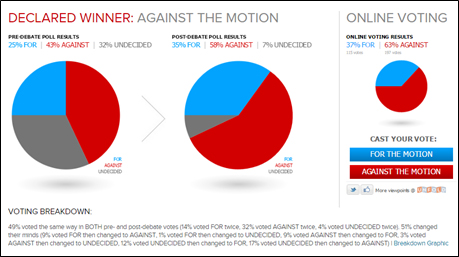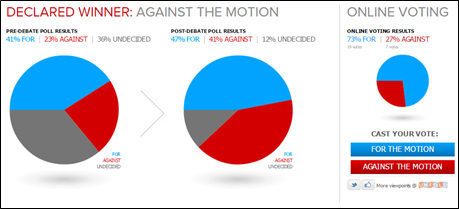Ridicule, ostracization, a failing economy – The Economist admits that regarding Putin “as a success might seem bleakly comical.” But is the West misjudging him? There are two Intelligence Squared U.S. debates that have explored Russia’s power struggle in depth over the last decade: “Russia Is Becoming Our Enemy Again” (2007) and “Russia Is A Marginal Power” (2014).
In 2007, the debate was positioned differently than it is today. Clearly President Putin had presided over a massive transfer of wealth and influenced a new Russian elite of former KGB operatives. He was an autocrat who wanted to keep his power. Russia was pursuing a far more assertive foreign policy, disrupting oil supply when displeased by its neighbors, threatening a new arms race, attacking the U.S. as, quote, “the main violator of freedoms and human rights.” On the back of $90 oil, the Russian economy was growing rapidly. The bear was well-fed and snarling. And by all accounts, the Russian public heartily approved.
The question we debated in 2007 was whether a new Cold War was emerging. The most troublesome evidence was and still is Russia’s belligerence, even when its interests and ours seem to be aligned.
On the other hand, it was easy to understand why Russia might be smarting from a loss of empire, and international respect. Why it might have been wary about an American missile defense shield and Nato’s expansion in its own back yard. It’s easy to see why the former oligarchs were viewed as having gained their wealth illegitimately. And it’s understandable why Russia favors economic sanctions to exert pressures in its neighborhood, particularly when sanctions are favored policy tool of ours. So it’s easy to see how Putin’s assertiveness enhances his domestic popularity and power.
Was Russia becoming our enemy again, or was it reacting in an understandable way to domestic political considerations, or perhaps to our own mistakes? In 2007, audiences at the live event were persuaded that Russia was in fact not becoming our enemy again. While the majority cast votes in favor of the motion, 18% changed their minds when hearing both sides debate, which you can watch here.
Fast Forward
In 2014, on the heels of the Winter Olympics in Russia, we revisited the state of Russian influence and Putin’s foreign policy actions, specifically on the notion that Russia had become a “marginal power.” Why a “marginal power” and not a force to behold? Because marginal power is the dichotomy of great power. Those are the two opposites: is Russia’s influence marginal on the world stage, or is it in fact a great power?
Both sides explored whether Russia marginalized itself by conducting foreign policy in a way that lead to its isolation from the great powers of the world. Yes, it may have Yanukovych as a friend in Ukraine. Or it may have Assad as a friend in Syria. But who wants friends like that? It may be pushing its weight around with its gas exports in Europe, but Europe is now trying to find alternatives to that kind of reliance. It may be sticking its nose — sticking its thumb in America’s eye with the way it responded to Snowden, but it’s on the verge of losing its status as a G8 member. And it’s really moving itself into the periphery of the global centers of power.
In counter to that argument, Russia has enjoyed a substantial measure of geo-political success. They think strategically like a great power. They act like a great power. And they’ve been successful in their initiatives. Until recently, Russia was one of the world’s largest oil producers, yet it remains an authoritarian state, rife with corruption and economic struggles.
At the debate, we asked: is our toxic relationship something to worry about, or is Putin’s Russia fading in importance? Seven years later, the IQ2US audience took a different stance, siding with the notion that Russia is not a marginal power and should be taken seriously:

What’s Next?
The latest Economist piece concluded that Putin “has graduated from harassing ambassadors and assassinating critics to invasions. This is one of his assets: a readiness to stoop to methods the West cannot emulate without sullying itself.”
What is to be done? The Economist argues that the West must give Ukraine aid and support to join the EU as is necessary, and that former Soviet Union countries that have joined Western institutions should be included in that strategy. “Western leaders must make it clear, to him and their own people, that they will defend their allies, and the alliance—even if the struggle is covert and murky.”
That Intelligence Squared U.S. audiences have changed perspectives over time gives credence to the argument that we must recognize the gravity of the Russian threat (and deal with it).
Watch both debates and hear the arguments for yourself. Is it time to stop thinking of Russia as a marginal power? Is intervention necessary? Cast your vote here.
–Robert Rosenkranz
Illustration by Thomas James for Intelligence Squared U.S.





